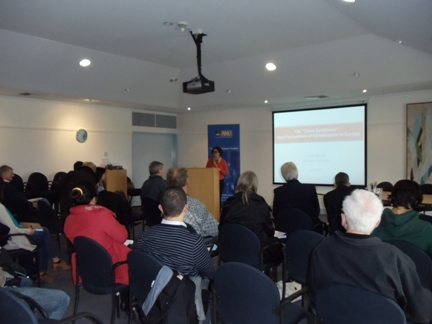The ‘China Syndrome’: New Perceptions of Globalisation in Europe
This public lecture is now available as: MP3 (please listen to the file below in three parts) and PDF (as a courtesy to the presenter, please contact her for permission to refer to her PowerPoint notes for the purpose of further research).
The relation between Europeans and globalisation has long been ambiguous. In Europe, perceptions of globalisation are hard to disentangle from perceptions of European integration because they have occurred in tandem. In some cases the European Union (EU) has subversively acted as a Trojan Horse that helped bring globalisation into the heart of Europe. In other cases, the EU has indeed been Europe’s best defense against the negative effects of globalisation. This seminar presentation will focus on what has changed in European perceptions of globalisation during the past five years – in the era following the demise of Lehman Brothers and the Eurozone crisis, maybe even a ‘post-American’ era. It will emphasise four recent developments: the progressive demonisation of globalisation; the disillusionment about the European Union’s capacity to manage globalisation; the ‘de-Americanisation’ of globalisation; and the perceived domination of China as the main driver and the main beneficiary of globalisation today.
Dr Sophie Meunier is a Research Scholar in Public and International Affairs and Co-Director of the European Union Program at Princeton University. A Franco-American political scientist, she is an expert in European integration, the politics of European trade policy, and the politics of anti-Americanism. Her current research focuses on anti-Americanism, as well as the ambiguous links between Europeanization and globalisation. Dr Meunier has published many articles in academic journals, as well as in magazines and newspapers such as Foreign Affairs, Foreign Policy, Le Monde, Le Figaro, and The Huffington Post, while her first book, The French Challenge: Adapting to Globalization (Brookings Institution Press, 2001), co-written with Philip Gordon, won the 2002 France-Ameriques Book Award.
To view the flyer for this event please see: The ‘China Syndrome’: New Perceptions of Globalisation in Europe

